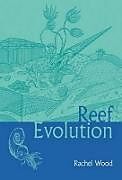Reef Evolution
Einband:
Kartonierter Einband
EAN:
9780198577843
Untertitel:
Englisch
Genre:
Biologie
Autor:
Rachel Wood
Herausgeber:
Oxford Academic
Anzahl Seiten:
426
Erscheinungsdatum:
27.05.1999
ISBN:
978-0-19-857784-3
This text documents those biological innovations which have moulded the evolution of reef ecosystems and given rise to the highly complex communities found today. The appearance of clonality, the acquisition of photosymbiosis and the radiation of predator groups are all discussed.
'...of value not only to advanced undergraduate and postgraduate course, but also to researchers in modern and ancient reef ecology.' Ethology Ecology and Evolution
Autorentext
Rachel Wood, Royal Society Research Fellow, Gonville and Caius College, University of Cambridge, Cambridge, CB2 1TA. Tel 01223-335420 Email: rw43@esc.cam.ac.uk
Klappentext
If one does not understand the biology of the coral reef, one does not understand the reef at all. So, using more than 250 illustrations and specially drawn ecological reconstructions of reef communities, Rachel Wood provides a unique evolutionary approach to the understanding of ancient coral
reef ecosystems. Marine organisms have aggregated to form reefs for over 3.5 billion years--creating the largest biologically constructed feature on earth, some visible from space. However, their study has been largely descriptive.
Reef Evolution, documents the fundamental biological processes and innovations which have molded the evolution of reef ecosystems and given rise to the highly complex communities found today. The appearance of clonality, the acquisition of photosymbiosis, and the radiation of predator groups are all
discussed in depth. Data from the fossil record documents the evolutionary development of reef ecosystems. Although reefs only occupy a small percentage of the oceans, their importance to the marine environment is many-faceted and global. They create harbors and allow the development of shallow
basins with associated mangrove or seagrass communities; they protect coastlines from erosion; are involved in the regulation of atmospheric carbon, which in turn contributes to climate control. can provide extensive oil and gas reservoirs. From a biological standpoint, however, the great
significance of reefs lies in their ability to generate and maintain a substantial proportion of tropical marine biodiversity. This unique interdisciplinary approach provides students and researchers in evolution, marine biology, ecology, paleontology, biodiversity, and geology with atext that will
allow them to truly understand the biological innovations which have molded the evolution of coral reefs and given rise to the highly complex communities found today.
Zusammenfassung
Reefs are an extraordinary natural phenomenon. Visible from outer space, coral reefs are the largest biologically constructed features known; in close proximity their spectacular beauty and abundance of life is dazzling. Reefs are estimated to occupy only a small percentage of the oceans, but their importance to the marine environment is many-faceted and global. Reefs create harbours and allow the development of shallow basins with associated mangrove or seargrass communities; they protect coastlines from erosion; reefs are involved in the regulation of atmospheric carbon, which in turn contributes to climate control; ancient reefs can provide extensive oil and gas reservoirs. From a biological standpoint, however, the great significance of reefs lies in their ability to generate and maintain a substantial proportion of tropical marine biodiversity. This text documents those biological innovations which have moulded the evolution of reef ecosystems and given rise to the highly complex communities found today. The appearance of clonality, the acquisition of photosymbiosis and the radiation of predator groups are all discussed in depth. Throughout the book, Rachel Wood uses data from the fossil record to document the evolutionary development of reef ecosystems. This interdisciplinary approach has the aim of providing an analytical text which will be of value not only to advanced undergraduates and postgraduate courses, but also to researchers in ancient reef ecology. Rachel Wood is Royal Society University Research Fellow, and Fellow, Gonville and Caius College, Cambridge
Inhalt
1. An introduction to reefs; 2. The recognition of ancient reefs; 3. The record: ancient reef ecologies; PART I. ENVIRONMENTAL CONTROLS; 4. The role of physicochemical change; 5. Mass extinctions: collapse and recovery; PART II. EVOLUTIONARY INNOVATION; 6. Life on a substrate: trends in growth fomr and function; 7. The rise of biological disturbance; 8. Photosymbiosis: access to a new metabolic capability; Appendix: Geological Time Scale; References; Glossary; Index

Leider konnten wir für diesen Artikel keine Preise ermitteln ...
billigbuch.ch sucht jetzt für Sie die besten Angebote ...
Die aktuellen Verkaufspreise von 6 Onlineshops werden in Realtime abgefragt.
Sie können das gewünschte Produkt anschliessend direkt beim Anbieter Ihrer Wahl bestellen.
Loading...
Die aktuellen Verkaufspreise von 6 Onlineshops werden in Realtime abgefragt.
Sie können das gewünschte Produkt anschliessend direkt beim Anbieter Ihrer Wahl bestellen.
| # | Onlineshop | Preis CHF | Versand CHF | Total CHF | ||
|---|---|---|---|---|---|---|
| 1 | Seller | 0.00 | 0.00 | 0.00 |
